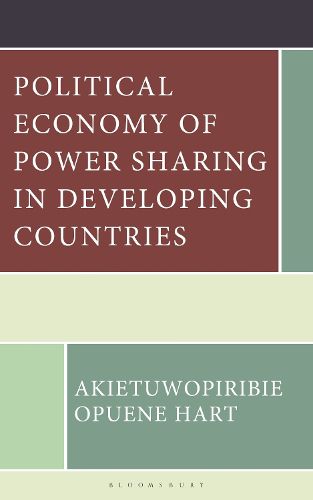Readings Newsletter
Become a Readings Member to make your shopping experience even easier.
Sign in or sign up for free!
You’re not far away from qualifying for FREE standard shipping within Australia
You’ve qualified for FREE standard shipping within Australia
The cart is loading…






Political Economy of Power Sharing in Developing Countries is an in-depth examination of factors that trigger the clamor for power sharing, zoning and rotation in mostly developing countries. These provocations include geographical, ethnic, and religious identity factors that can influence the political process in varying degrees from country to country. The impact goes a long way in determining the stability and instability of the political process in various countries. The reasons for these differences and the impacts are a combination of the endogenous variables in the first instance, which are the primary prompters. Other elements, which are the exogenous factors, are secondary prompters. When these converge, they produce a peculiar impact in a given society based on the characteristic variables and the resulting outcome. The new paradigm shifts in the agitation in developing countries is demonstrated by an elitist instrument of marginalization and self-aggrandizement. The masses are hoodwinked, sensitized, and manipulated through primal sentiment to support the elites in acquiring political power, which in turn enables the acquisition of economic power.
$9.00 standard shipping within Australia
FREE standard shipping within Australia for orders over $100.00
Express & International shipping calculated at checkout
Political Economy of Power Sharing in Developing Countries is an in-depth examination of factors that trigger the clamor for power sharing, zoning and rotation in mostly developing countries. These provocations include geographical, ethnic, and religious identity factors that can influence the political process in varying degrees from country to country. The impact goes a long way in determining the stability and instability of the political process in various countries. The reasons for these differences and the impacts are a combination of the endogenous variables in the first instance, which are the primary prompters. Other elements, which are the exogenous factors, are secondary prompters. When these converge, they produce a peculiar impact in a given society based on the characteristic variables and the resulting outcome. The new paradigm shifts in the agitation in developing countries is demonstrated by an elitist instrument of marginalization and self-aggrandizement. The masses are hoodwinked, sensitized, and manipulated through primal sentiment to support the elites in acquiring political power, which in turn enables the acquisition of economic power.